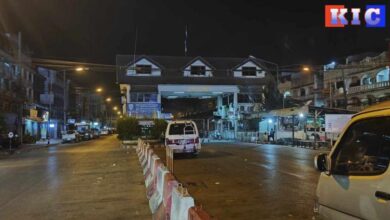Census Favors Govt Position, Disadvantages Ethnic People

Experts warn that Burma’s coming census could sow mistrust among ethnic groups and be used by the government to cement its political position.
Mark Farmaner, the director of Burma Campaign UK, said that Burma’s proposed census in March could undermine the political and civil rights of ethnic minority groups, and that troubling signs of misuse have already appeared in the build up to the nationwide count.
“Tensions are already being exacerbated both between ethnic groups and with the government,” Mr Farmaner said. “One example is people from some smaller ethnic groups who have complained that the main ethnic groups treat them the way they complain they are treated by Burmans, being told to register as the main ethnic group, rather than their sub group.”
Several ethnic leaders have raised concerns about how the census will handle ethnic identity, a January policy briefer published by the Peace Research Institute Oslo observed. It also notes that dropping ethnicity from the questionnaire “should be seriously considered.”
In light of these worries, Karen leaders have taken some important steps in addressing the complexity of ethnic identity, Mr Farmaner said.
“Karen groups seem to have taken a very positive approach in saying that people should be able to self-identify,” he said. “For all ethnic groups it makes sense to postpone the census, not just because of the tensions being created, but also because in the current political climate in Burma data collected is not likely to be accurate. This in turn, under the current constitution, means ethnic people not having proper representation in parliament.”
Respondents will be able to identify as whichever ethnic category they wish, but they will be counted as “other” if the choice is not among the country’s 135 officially recognized groups, according to the PRIO. The census will also track the religious persuasion of respondents, as well factors such as possible disabilities, family size, and residency patterns.
A statement released last week by Burma Campaign UK also highlights ways in which the group fears the census might not accurately count vulnerable populations – such as internally displaced people in Karen State – and push less populous groups to the side by solidifying discriminatory practices.
“There is a very high risk of marginalization of smaller minority groups. The UN Special Rapporteur on Burma has recommended ending the current race-based citizenship law,” Mr Farmaner said. “It was very clever of Ne Win to exploit the strong desire of ethnic people for official recognition by creating a citizenship law which on paper gives many groups this recognition, but in practice is all about divide and rule and marginalizing smaller ethnic groups. The Burmese government is still using this desire for official recognition as a tool for controlling ethnic groups.”
Outside donors and Western governments are footing the majority of the project’s $58.5 million bill, which marks the country’s first official tally of its citizens since a contested 1983 count.
Burma Team Lead Steven Kiersons of The Sentinel Project, a group that monitors the risk of genocide in areas of conflict, said that minorities have been historically targeted for subjugation in Burma, and that a census in such a politically charged atmosphere will lead to bloodshed.
“On the national level, the standing policy written into law that denies Rohingya citizenship has been a method to deny them employment, political representation, and state protection since 1982,” Mr Kiersons said. “The Burmese government’s policy of nation-building has discriminated against Karen, Shan, Rohingya, and Chinese minorities, among others.”
A risk of such censuses, Mr Kiersons said, is that they can codify perceived racial differences, citing ethnic classifications used in Nazi Germany and colonial Rwanda. Such a possibility is worrisome, he added, for minority groups that could be excluded from the country’s official ethnic narrative entirely.
“This census is not so much about classification, but about denial,” Mr Kiersons said. “Those intent on genocide in Burma intend also to deny it ever happened. By classifying the Rohingya as Bengali they intend to claim they did not exterminate the Rohingya, but foreign elements of Bangladesh.”
Following questions raised by Burma Campaign UK and others, Mr Farmaner said it’s best to not go ahead with the census in its current form.
“Removing questions on ethnicity and religion, and just doing some kind of headcount instead is one option, but it won’t address many problems, including accuracy of data collected in ethnic areas, and suspicion of government meaning people don’t give accurate data,” he said. “Some ethnic representatives say that being able to register their ethnicity is very important, so we believe it is better to postpone than just do a headcount.”
Especially bothersome for observers like Mr Farmaner is the possibility that census results could lead to even less leverage for minorities that have been long kept outside the country’s political fabric.
“There are huge potential implications for the form of any future federal system and political representation,” he said. “Undercounting of ethnic groups will put them in a weaker position, and I don’t think anyone would claim that the government can be trusted not to try to ensure lower counting of ethnic people.”




